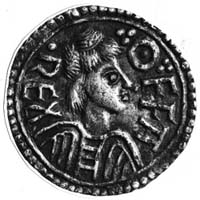July 29, 796: Death of King Offa of Mercia
 |
| Coin of King Offa of Mercia, facing right. Legend: OFFA REX. |
King Offa died in 796; the
Anglo-Saxon Chronicle gives the date as 29 July. In his charters and coins he was simply
rex Merciorum, king of the Mercians. But in practice, he took over most of the country south of the Humber, excepting only Wessex (
see map), and the king of Wessex (Beorhtric) was his son-in-law. When the Archbishop of Canterbury refused to obey him, Offa arranged the creation of a third archbishopric, in Lichfield in the heart of Mercia, whose incumbent was firmly under his control. (The archdiocese of Lichfield was quietly cancelled after Offa's death.) King Charles the Great of the Franks (Charlemagne) wrote to Offa and called him brother. And, of course, he built Offa's Dyke, a massive earthwork that ran 64 miles between Mercia and northern and central Wales, still visible to this day.
After Offa's death, the smaller kingdoms (Kent, East Anglia, Essex) broke free, but were soon recaptured, and remained under Mercian control until the balance shifted in the 820s and Wessex emerged as the most powerful southern kingdom.
Review the history, 757-803.
Note on the coin: While most heads on Anglo-Saxon coins are nondescript or based on earlier models (and so don't count as evidence for what the kings really looked like), this distinctive "curly-headed" portrait is unique to coins of Offa.
